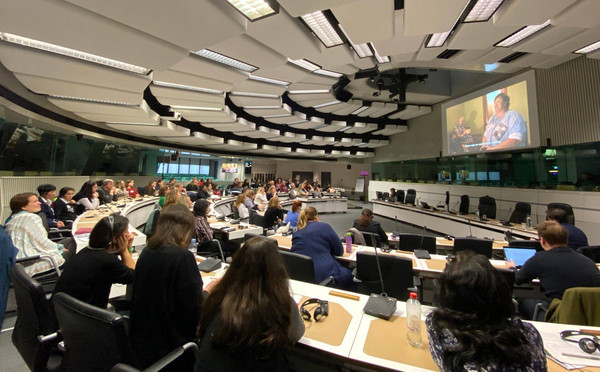New Documentary highlights impact of the war on persons with disabilities in Ukraine

On 30th November the European Association of Service providers for Persons with Disabilities (EASPD)hosted the European premiere of the documentary ‘Ukraine: Paused Reforms’. The documentary addresses the realities of vulnerable groups, including persons with disabilities, who have been forced to remain in Ukraine since the outbreak of full-scale war.
According to the UNICEF Ukraine Country Office’s 2021 annual report, Ukraine has one of the highest rates of children in residential care institutions in Europe. Since 2017, Ukraine began to implement a deinstitutionalisation reform which aimed to set the country on the path to development of community-based services for children and persons with disabilities. With the onset of the full-scale invasion of the country by the Russian Federation however, many of these reforms were forced to be put on pause. This pause has left thousands of vulnerable people, including many persons with disabilities, who remain in the country, without access to their basic human rights.
Filmed in September 2022, ‘Ukraine: Paused Reforms’ addresses the continuation of institutional services within the country, many of which result in the long-term institutionalisation of their residents. The documentary also highlights the essential nature of support services, regardless of war, and the devastating impact that the unavailability of quality, community-based services have on the lives of people with disabilities.
EASPD acknowledges and supports the efforts the Ukrainian government has made to uphold the rights and promote the social inclusion of those who are most vulnerable in their society while being in a state of war. However, there remains major concerns for the rights of many of those who remain in the country, in particular those who have been institutionalised.
Immediate action is needed to ensure that the human rights of persons with disabilities, women and those from minority ethnic groups who are living in institutions are respected. Speaking at the documentary’s launch event Halyna Kurylo ofDRI Advocacy Ukraine said ‘Institutions are dangerous places - not places of safety- for children in war or other times. The UN Guidelines on Deinstitutionalisation state that, in times of war, the deinstitutionalisation process should be accelerated, rather than paused. Ukraine has a responsibility to protect its most vulnerable citizens in times like this. DRI and disability rights activists in Ukraine believe that the democracy Ukraine is fighting for should respect the rights of every citizen, including those with disabilities in institutions.’
Zoreslava Liulchak, Director of the Dzherelo Rehabilitation Centre, who’s work to provide community based services to those who have remained in Ukraine is featured in the documentary, said: ‘With the support of the United Nations Fund, UNICEF, Dzherelo Center is currently delivering emergency assistance for children with disabilities, special educational needs and their families in 7 regions of Ukraine. Moving forward, we hope to work with local authorities more closely, to further embed these community services within the community on the long term.’
The launch event included the participation of representatives of the Ukrainian government, who expressed the government’s commitment to deinstitutionalization. Uliana Tokarieva, Deputy Minister of Social Policy of Ukraine spoke of the need to build back better, which included the adaptation of legislation and targeting resources to community-based services throughout the country. Daria Herasymchuk, Advisor and Commissioner of the President of Ukraine on Child`s Rights and Children Rehabilitation maintained that Ukraine’s path towards deinstitutionalization has not stopped in the face of war, but continues to make progress, albeit at a slower pace. With the country currently baring the repercussions of the full-scale invasion, which includes regular cuts to power and a scarcity of gas during the winter month, MsHerasymchuk, also stressed the need for additional international support to ensure that this progress is sustained.
Speaking at the launch of the event Maya Doneva, EASPD Secretary General, said “The people of Ukraine continue to embody strength and courage as they fight for the freedom and independence of their country. This freedom must be extended to those living in institutions in Ukraine. EASPD urges the Ukrainian government to work with key international organisations, already present in the country, as well as local organisations who are implementing community-based services to continue Ukraine’s path towards deinstitutionalisation of support services.”
To watch the documentary, click here. To watch the panel discussions, click here.
Supporting Documents:
Please contact:
Rachel Vaughan
Head of Operations
rachel.vaughan@easpd.eu
+32 2 233 77 23
Note to editors:
The European Association of Service providers for Persons with Disabilities is a non-profit European umbrella organisation, established in 1996, and currently representing over 20,000 social and health services for persons with disabilities. EASPD advocates effective and high-quality disability-related services in the field of education, employment and individualised support, in line with the UN CRPD principles, which could bring benefits not only to persons with disabilities, but to society as a whole.

